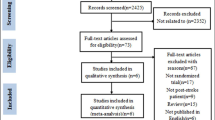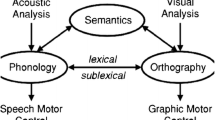Abstract
In 1833 an accomplished 26-year-old linguist suffered a non-paralytic stroke. After he recovered, though he could utter a variety of syllables with ease, he spoke an unintelligible jargon that caused him to be mistaken as a foreigner. He was examined repeatedly over the course of a year by Jonathan Osborne (1794–1864), a Dublin physician and professor of materia medica, who found that the patient understood whatever was said to him, that he could read and write fluently, but had difficulty repeating words read to him or in reading aloud. Osborne recommended that he learn to speak English, his natural language, de novo and over 8 months measured his considerable improvement. To explain the patient’s singular difficulty in repeating spoken words Osborne argued it was ‘highly probable that, having been conversant with five languages, the muscular apparatus ranged among them, forming a kind of polyglot jargon [that was] wholly unintelligible’ and the patient was ‘unable to penetrate into and select the contents of the store according as the [words] were required’. The discrepancy between comprehension and repetition was later termed conduction aphasia.


Similar content being viewed by others
References
Cameron CA (1886) History of the Royal College of Surgeons in Ireland. Fannin, Dublin, p 646
Breathnach CS (2009) Jonathan Osborne (1794–1864) MD, FRCPI. J Med Biogr 17:144–148
Osborne J (1834) On the loss of the faculty of speech depending on the forgetfulness of the art of using the vocal organs. Dublin J Med Chem Sci 4:157–170 (this paper was the subject of a Poster Presentation at meeting of Association of British Neurologists, Dublin, on 27 March 2008)
Osborne J (1843) On the deprivation of the faculty of speech while the intellect remains entire, and in which the defect does not arise from paralysis of the vocal organs. Proc R Irish Acad 2:395–402
Crampton P (1832) On certain injuries of the head. Dublin J Med Chem Sci 2:30–45, 199–211
Larrey D-J (1829) Clinique chirurgicale exercée particulièrement dans les camps et les hôpitaux militaires depuis 1792 jusqu’en 1829, Paris, Gabon, pp 1829–1836
Jellinek EH (2002) An unlikely aphasiologist: D J Larrey. J R Soc Med 95:368–370
Gall F (1800) Philosophische-medizinische Untersuchungen über Natur und Kunst im kranken und gesunder Zustaande des Menschen. Leipzig, Baumgaartner, 1800, cited by F Schiller in The Founders of Neurology edited by W Haymaker and F Schiller, Sprinfeld, Ill. C C Thomas, 2nd edn, pp 31–35, 1970
Bouillaud MJ (1825) Recherches cliniques propres…demontrer que la perte de la parole correspond à la lésion des lobules antérieurs du cerveau, et a confirmer l’opinion de M Gall, sur le siège de l’organe du langage articulé. Arch Gén Méd 8:25–45
Lallemand C-F Recherches anatomo-pathologiques sur le encéphale et ses dépendances. Paris, Badouin fils et Béchet jeune, 1824–1825
Luzzatti C, Whitaker H (2001) Jean-Baptiste Bouillaud, Claude-François Lallemand, and the role of the frontal lobe. Arch Neurol 58:1157–1162
Broca P (1861) Remarques sur le siège de la faculté du langage articulé, suivies d’une observation d’aphémie. Bull Soc Anat 36:330–357
Wernicke C (1874) Der aphasische Syndromenkomplex. Cohn und Weigert, Breslau
Wernicke C (1906) Grundriss der Psychiatrie in klinischen Vorlesungen. Thieme,Leipzig
Catani M, Mesulam MM (2008) The arcuate fasciculus and the disconnection theme in language and aphasia: history and current state. Cortex 44:953–961
Goldstein K (1948) Language and language disturbances. Grune and Stratton, New York
Geschwind N (1965) Disconnexion syndromes. Brain 88:257–296, 585–644
Acknowledgments
Mary O’Doherty, archivist, and Robert Mills, librarian, in the Royal Colleges of Surgeons and Physicians, respectively, and John Moynihan helped in the preparation of the paper. Dr. Christopher Gardner-Thorpe, editor Journal of Medical Biography kindly consented to presentation of this facet of Jonathan Osborne’s work.
Author information
Authors and Affiliations
Corresponding author
Rights and permissions
About this article
Cite this article
Breathnach, C.S. Jonathan Osborne (1794–1864) and his recognition of conduction aphasia in 1834. Ir J Med Sci 180, 23–26 (2011). https://doi.org/10.1007/s11845-010-0631-y
Received:
Accepted:
Published:
Issue Date:
DOI: https://doi.org/10.1007/s11845-010-0631-y




